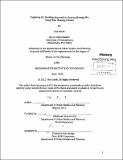| dc.contributor.advisor | Annette Kim. | en_US |
| dc.contributor.author | Umoh, Nse (Nseabasi Effiong) | en_US |
| dc.contributor.other | Massachusetts Institute of Technology. Dept. of Urban Studies and Planning. | en_US |
| dc.coverage.spatial | f-nr--- | en_US |
| dc.date.accessioned | 2012-10-10T15:49:39Z | |
| dc.date.available | 2012-10-10T15:49:39Z | |
| dc.date.copyright | 2012 | en_US |
| dc.date.issued | 2012 | en_US |
| dc.identifier.uri | http://hdl.handle.net/1721.1/73831 | |
| dc.description | Thesis (M.C.P.)--Massachusetts Institute of Technology, Dept. of Urban Studies and Planning, 2012. | en_US |
| dc.description | Cataloged from PDF version of thesis. | en_US |
| dc.description | Includes bibliographical references (p. 63-69). | en_US |
| dc.description.abstract | The magnitude of the housing problem in Nigeria is immense; the current deficit is around 12 to 16 million units. Government attempts to address housing availability has been a recurring theme throughout Nigeria's history. Yet, many government led interventions of direct provision have been unable to significantly impact access to and supply of housing for low and moderate income populations. While messy political realities are acknowledged as contributing to the failure of many of these past housing programs, the analysis of the necessary solutions are more focused on financial and property rights institutions, the broad economic environment and physical capital. Articulating the solutions to the challenges around housing production and access in Nigeria in this way, has led to the embrace and official endorsement of the "enabling" framework, which advances private sector participation in the housing market through prioritizing the aforementioned "necessary solutions," as critical to solving Nigeria's housing access issues. This thesis explores the "enabling" approach to housing by investigating one particular program in Nigeria, the Abuja Mass Housing Scheme (MHS). On paper, the MHS seems to adopt this framework as a mechanism for strengthening housing supply and demand in Abuja, Nigeria. This thesis explores the challenges that have been encountered in the MHS with a particular emphasis on understanding why the "enabling" framework as implemented in this case has not worked? The sub-questions include: What might the application of the enabling framework for housing in the Abuja MHS suggest about the challenges of the approach? What is required to actually make "enabling" work in a context like Nigeria? This thesis tries to answer these questions through applying a historical exploration of why and how Abuja was created and an analysis of the land institutions that deeply impact the housing development process in Abuja to an investigation of the MHS. The analysis of the MHS suggests that applications of the "enabling" framework need to aggressively consider the political realities on the ground in order to have any chance at working. This thesis argues that the "enabling" literature seems to have overemphasized market functions to the exclusion of politics, governance and accountability and that if politics are not considered in the framing or embrace of the "enabling approach" the intended impact of the framework cannot be successfully achieved. Moreover, it argues that the attempts to implement an "enabling approach" ought to be grounded in a deep analysis of which actors are being enabled and the potential unintended consequences of this. | en_US |
| dc.description.statementofresponsibility | by Nse Umoh. | en_US |
| dc.format.extent | 69 p. | en_US |
| dc.language.iso | eng | en_US |
| dc.publisher | Massachusetts Institute of Technology | en_US |
| dc.rights | M.I.T. theses are protected by
copyright. They may be viewed from this source for any purpose, but
reproduction or distribution in any format is prohibited without written
permission. See provided URL for inquiries about permission. | en_US |
| dc.rights.uri | http://dspace.mit.edu/handle/1721.1/7582 | en_US |
| dc.subject | Urban Studies and Planning. | en_US |
| dc.title | Exploring the enabling approach to housing through the Abuja Mass Housing Scheme | en_US |
| dc.type | Thesis | en_US |
| dc.description.degree | M.C.P. | en_US |
| dc.contributor.department | Massachusetts Institute of Technology. Department of Urban Studies and Planning | |
| dc.identifier.oclc | 811562501 | en_US |
